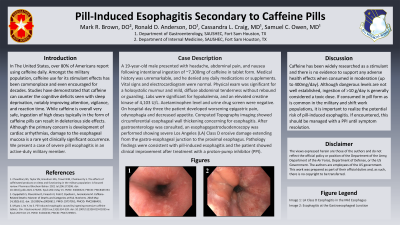Tuesday Poster Session
Category: Esophagus
P3335 - Pill-Induced Esophagitis Secondary to Caffeine Pills
Tuesday, October 24, 2023
10:30 AM - 4:00 PM PT
Location: Exhibit Hall

Has Audio
- MB
Mark R. Brown, DO
San Antonio Military Medical Center
San Antonio, TX
Presenting Author(s)
Mark R. Brown, DO1, Ronald Anderson, DO1, Cassandra Craig, MD2, Samuel Owen, MD1
1San Antonio Military Medical Center, San Antonio, TX; 2San Antonio Military Medical Center, Fort Sam Houston, TX
Introduction: In The United States, over 80% of Americans report using caffeine daily. Amongst the military population, caffeine use for its stimulant effects has been commonplace and even encouraged for decades. Studies have demonstrated that caffeine can counter the cognitive deficits seen with sleep deprivation, notably improving attention, vigilance, and reaction time. While caffeine is overall very safe, ingestion of high doses typically in the form of caffeine pills can result in deleterious side effects. Although the primary concern is development of cardiac arrhythmias, damage to the esophageal mucosa is a rare yet clinically significant occurrence. We present a case of severe pill esophagitis in a 19yo active-duty military member.
Case Description/Methods: A 19-year-old male presented with headache, abdominal pain, and nausea following a suicide attempt with consumption of ~7,300mg of caffeine. Medical history was unremarkable and he denied any daily medications or supplements. Vital signs and electrocardiogram were normal. Physical exam was significant for a holosystolic murmur and mild, diffuse abdominal tenderness without rebound or guarding. Labs were significant for hypokalemia, and an elevated creatine kinase of 4,103 U/L. Acetaminophen level and urine drug screen were negative. On hospital-day three the patient developed worsening epigastric pain and decreased appetite. Computed Topography imaging showed circumferential esophageal wall thickening concerning for esophagitis. Gastroenterology was consulted and an esophagogastroduodenoscopy was performed showing severe Los Angeles (LA) Class D erosive damage extending from the gastro-esophageal junction to the proximal esophagus. Pathology findings were consistent with pill-induced esophagitis and the patient showed clinical improvement after treatment with a proton-pump inhibitor (PPI).
Discussion: Caffeine has been widely researched as a stimulant and there is no evidence to support any adverse health effects when consumed in moderation (up to 400mg/day). Although dangerous levels are not well established, ingestion of >10 g/day is generally considered a toxic dose. Fatality from caffeine is rare with the most common cause of death being ventricular fibrillation. If consumed in pill form as is common in the military and shift work populations, it is important to realize the potential risk of pill-induced esophagitis. If encountered, this should be managed with a PPI until symptom resolution.

Disclosures:
Mark R. Brown, DO1, Ronald Anderson, DO1, Cassandra Craig, MD2, Samuel Owen, MD1. P3335 - Pill-Induced Esophagitis Secondary to Caffeine Pills, ACG 2023 Annual Scientific Meeting Abstracts. Vancouver, BC, Canada: American College of Gastroenterology.
1San Antonio Military Medical Center, San Antonio, TX; 2San Antonio Military Medical Center, Fort Sam Houston, TX
Introduction: In The United States, over 80% of Americans report using caffeine daily. Amongst the military population, caffeine use for its stimulant effects has been commonplace and even encouraged for decades. Studies have demonstrated that caffeine can counter the cognitive deficits seen with sleep deprivation, notably improving attention, vigilance, and reaction time. While caffeine is overall very safe, ingestion of high doses typically in the form of caffeine pills can result in deleterious side effects. Although the primary concern is development of cardiac arrhythmias, damage to the esophageal mucosa is a rare yet clinically significant occurrence. We present a case of severe pill esophagitis in a 19yo active-duty military member.
Case Description/Methods: A 19-year-old male presented with headache, abdominal pain, and nausea following a suicide attempt with consumption of ~7,300mg of caffeine. Medical history was unremarkable and he denied any daily medications or supplements. Vital signs and electrocardiogram were normal. Physical exam was significant for a holosystolic murmur and mild, diffuse abdominal tenderness without rebound or guarding. Labs were significant for hypokalemia, and an elevated creatine kinase of 4,103 U/L. Acetaminophen level and urine drug screen were negative. On hospital-day three the patient developed worsening epigastric pain and decreased appetite. Computed Topography imaging showed circumferential esophageal wall thickening concerning for esophagitis. Gastroenterology was consulted and an esophagogastroduodenoscopy was performed showing severe Los Angeles (LA) Class D erosive damage extending from the gastro-esophageal junction to the proximal esophagus. Pathology findings were consistent with pill-induced esophagitis and the patient showed clinical improvement after treatment with a proton-pump inhibitor (PPI).
Discussion: Caffeine has been widely researched as a stimulant and there is no evidence to support any adverse health effects when consumed in moderation (up to 400mg/day). Although dangerous levels are not well established, ingestion of >10 g/day is generally considered a toxic dose. Fatality from caffeine is rare with the most common cause of death being ventricular fibrillation. If consumed in pill form as is common in the military and shift work populations, it is important to realize the potential risk of pill-induced esophagitis. If encountered, this should be managed with a PPI until symptom resolution.

Figure: Image A: Esophagitis in the Mid Esophagus
Image B: LA Class D Esophagitis at the Gastroesophageal Junction
Image B: LA Class D Esophagitis at the Gastroesophageal Junction
Disclosures:
Mark Brown indicated no relevant financial relationships.
Ronald Anderson indicated no relevant financial relationships.
Cassandra Craig indicated no relevant financial relationships.
Samuel Owen indicated no relevant financial relationships.
Mark R. Brown, DO1, Ronald Anderson, DO1, Cassandra Craig, MD2, Samuel Owen, MD1. P3335 - Pill-Induced Esophagitis Secondary to Caffeine Pills, ACG 2023 Annual Scientific Meeting Abstracts. Vancouver, BC, Canada: American College of Gastroenterology.
